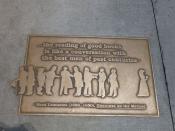Philosophical Argument
Final Copy
Although they differ in method, both Descartes and Plato share relatable views and opinions on the methods of doubt and recollection. Each philosopher is able to color in his method with theoretical insight and depth. There is a recognizable link between the two methods. Descartes uses Plato's method of recollection while in the process of explaining his own.
Descartes takes on the doubtful viewpoint and points out that not everything is what it necessarily seems. He states that he wants to rid himself of all the opinions that he had formally accepted and to in a way start over, and this would be the only way to determine what in fact true. Descartes acknowledges that everything we have accepted as being true and certain, we have learned from and through our senses. He believes that sometimes our senses can in fact, be deceptive and we should not trust that which we may have already been deceived by.
" But it is sometimes proved to me that these senses are deceptive, and it is wiser not to trust entirely to anything by which we have once been deceived." (James A. Gould & Robert J. Mulvaney, 2004, pg. 76, para. 2) He gives us an example of a dream and how dreams often seems very real to us but is a near figment of our imagination when we are sleeping. This supports his idea that at times our senses can be deceptive. But at the same time, how can we differentiate between the dream and the reality. He makes it seem as if our minds sometimes play tricks on us and what we may think is real and true could be totally false. Descartes does believe in God but questions if God brought it to pass that there...


